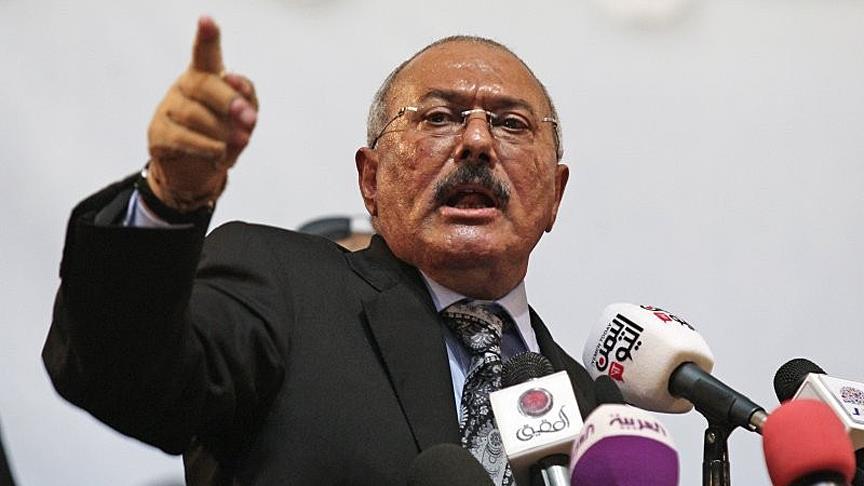‘No shame’ in maintaining ties with Iran: Yemen’s Saleh
Former president’s General Congress Party remains closely allied with Yemen’s Shia Houthi militia group

By Zakaria Kamali
SANAA, Yemen
Former Yemeni President Ali Abdullah Saleh on Wednesday called on Iran to "extend its hand” to his General Congress Party (GCP), which is closely allied with Yemen’s Shia Houthi militia group, saying there was “no shame” in maintaining ties with Tehran.
Saleh made the assertions while delivering an address to female members of his GCP, the text of which was later published on the party’s official website.
"Iran currently maintains relations with certain individuals [in Yemen], not with the Yemeni people,” Saleh said, without identifying the “individuals” to whom he was referring.
“These relations aren’t military, political or economic, but merely reflect the Iranian people’s sympathy regarding the war [in Yemen]," he added.
Saleh, whose GCP has remained closely allied with the Houthis since the latter overran capital Sanaa in 2014, went on to thank Iran for "sympathizing with Yemen”.
"As the head of an opposition party, I call on Iran to extend its hand to us in friendship,” the ex-president said.
“I am prepared to ally with Iran for the sake of my country, just as [Saudi Arabia’s anti-Houthi coalition] allied with Israel and the U.S. against us," he added.
"Relations with Iran -- a major Islamic state -- are no cause for shame," he asserted, stressing that his party did not currently have any military ties with Tehran.
Saleh went on to urge the Saudi-led coalition -- established in 2015 to fight the Houthis in Yemen -- to stop striking targets in Yemen “in return for a halt to the firing of ballistic missiles [by the Houthis]" at Saudi Arabia.
In March, Saudi air defenses claimed to have shot down four ballistic missiles fired into Saudi territory by Houthi rebels in Yemen.
The Saudi-led coalition, for its part, accuses Iran of providing weapons to both the Houthis and their pro-Saleh allies -- allegations denied by Tehran.
Saleh also reiterated calls for Saudi Arabia to halt its aggression in Yemen and engage in dialogue with the Houthis.
"We call on [Saudi] King Salman to enter into dialogue with the Yemeni people,” he said. “There has been enough bloodshed; let us agree on the appointment of a new president."
Saleh-Houthi rift?
On Tuesday evening, the official Saudi Press Agency quoted “informed sources” in Sanaa as saying that Saleh -- at a meeting with GCP members -- had threatened to “sell the Houthis out to the [Saudi-led] coalition” if the Shia group failed to meet his demands.
The news agency, however, refrained from saying what Saleh’s alleged “demands” consisted of.
The unnamed sources went on to quote Saleh as describing his Houthi allies as “extremists”.
The news agency provided no further details about the meeting in Sanaa.
Yemen has remained in a state of war since late 2014, when the Houthis and their pro-Saleh allies overran Sanaa and other parts of the country, forcing members of Yemen’s Saudi-backed government to temporarily flee to Riyadh.
In March of 2015, Saudi Arabia and its Arab allies launched a massive air campaign in Yemen aimed at reversing Houthi military gains and restoring the country’s internationally-recognized government.
Last year, Yemen’s government and the Houthi rebels entered into UN-backed peace talks in Kuwait in an effort to resolve the conflict, in which more than 10,000 people have been killed, according to UN figures.
The peace talks, however, failed to yield and tangible breakthroughs.
*Ali Abo Rezig contributed to this report from Ankara
Anadolu Agency website contains only a portion of the news stories offered to subscribers in the AA News Broadcasting System (HAS), and in summarized form. Please contact us for subscription options.







